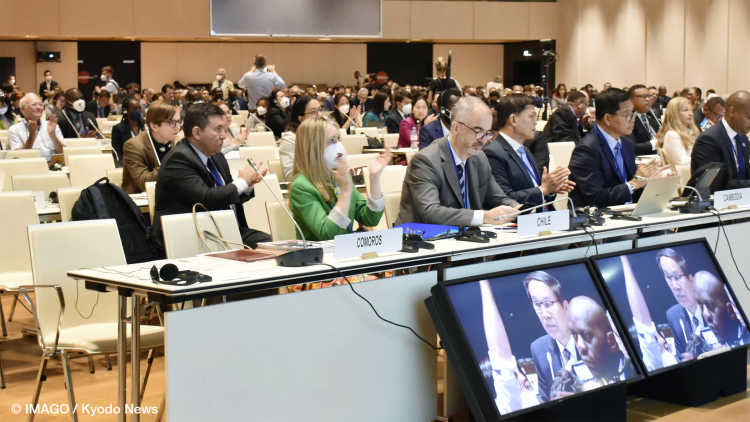- Home
- Publications
- GIGA Focus
- Das AUKUS-Abkommen: eher teures Signal als effektive Abschreckung
GIGA Focus Asia
The AUKUS Pact: More of a Costly Signal than Effective Deterrence
Number 2 | 2025 | ISSN: 1862-359X

In 2021, Canberra, London, and Washington announced the AUKUS security pact on nuclear-powered submarines for Australia and cooperation on new technologies with military applications. It remains intact under the second Trump administration: in early 2025, Canberra made a first payment to help uplift the US submarine industrial basis. The pact’s implementation as a whole is, however, questionable.
In the short to medium term, AUKUS the pact exerts no deterrent effect vis-à-vis the People’s Republic of China or other states. Even if things work out optimally, the first submarines will be delivered to Australia only in the 2030s.
How many, if any at all, nuclear-powered submarines the US and the UK will be able to deliver to Australia is unclear. The political risks and industrial challenges involved in their trilateral security cooperation are high, also given that naval shipyards for submarines in the US and the UK are having difficulties meeting domestic demand.
Building, maintaining and overhauling, as well as manning the future nuclear-powered submarines also constitute huge challenges for Australia in terms of personnel, training, and research.
Policy Implications
The AUKUS pact is primarily a costly foreign policy signal. The three partners are seeking to demonstrate their resolve to meaningfully respond to the military threat posed by the PRC. Canberra is binding itself even closer to the US in security terms. This portends substantial challenges and political risks for Australia, one of Germany’s few genuine values-based partners in the Indo-Pacific.
Footnotes
References
Briggs, Peter (2025), Virginia, we have a Problem, ASPI, The Strategist, 14. Januar, Zugriff 4. Februar 2025.
Briggs, Peter (2024), SSN AUKUS is at the Back of the Queue, ASPI, The Strategist, 27. Februar, Zugriff 4. Februar 2025.
Congressional Research Service (2025), Navy Virginia-Class Submarine Program and AUKUS Submarine (Pillar 1) Project: Background and Issues for Congress, 11. Februar, Zugriff 19. Februar 2025.
Fernandes, Clinton (2022), Subimperial Power: Australia in the International Arena, Carlton: University of Melbourne Press.
Gyngell, Allan (2017), Fear of Abandonment: Australia in the World since 1942, Carlton: La Trobe University Press.
Harpley, Unshin Lee (2024), Air Force to Keep Up Bombers Rotations in Australia, in: Air and Space Forces Magazine, 23. September, Zugriff 18. Februar 2025.
House of Commons Library (2024a), AUKUS Pillar 2: Advanced Capabilities, House of Commons Library, 2. September, Zugriff 20. Februar 2025.
House of Commons Library (2024b), AUKUS Submarine (SSN-A) Programme, House of Commons Library, 24. Oktober, Zugriff 13. Februar 205.
House of Commons Library (2021), The AUKUS Agreement, 11. Oktober, Zugriff 19. Februar 2025.
McKinley, Michael (2024), The Unquestioning and Unthinking that is AUKUS, in: New Zealand International Review, 49, 5, 2-6.
Packham, Ben, Cameron Stewart und Rhiannon Down (2025), Richard Marles Open to Meeting US Call to Lift Defence Spending to Three Per Cent, in: The Australian, 6. März.
Sheftalovich, Zoya (2021), Why Australia Wanted Out of Its French Submarine Deal, POLITICO, 21. September, Zugriff 18. Februar 2025.
Shoebridge, Michael (2025), AUKUS: From Strategic Partnership to a Deal Kept on the Road by Aussie Cash, Strategic Analysis Australia, Zugriff 17. Februar 2025.
Strating, Rebecca und Joanne Wallis (2024), Girt by Sea: Re-Imagining Australia’s Security, Carlton: La Trobe University Press.
White, Hugh (2024), Fatal Shores: AUKUS is a Grave Mistake, in: Australian Foreign Affairs, 20, 6-50.
Editor GIGA Focus Asia
Editorial Department GIGA Focus Asia
Regional Institutes
Research Programmes
How to cite this article
Köllner, Patrick (2025), The AUKUS Pact: More of a Costly Signal than Effective Deterrence, GIGA Focus Asia, 2, Hamburg: German Institute for Global and Area Studies (GIGA), https://doi.org/10.57671/gfas-25021
Imprint
The GIGA Focus is an Open Access publication and can be read on the Internet and downloaded free of charge at www.giga-hamburg.de/en/publications/giga-focus. According to the conditions of the Creative-Commons license Attribution-No Derivative Works 3.0, this publication may be freely duplicated, circulated, and made accessible to the public. The particular conditions include the correct indication of the initial publication as GIGA Focus and no changes in or abbreviation of texts.
The German Institute for Global and Area Studies (GIGA) – Leibniz-Institut für Globale und Regionale Studien in Hamburg publishes the Focus series on Africa, Asia, Latin America, the Middle East and global issues. The GIGA Focus is edited and published by the GIGA. The views and opinions expressed are solely those of the authors and do not necessarily reflect those of the institute. Authors alone are responsible for the content of their articles. GIGA and the authors cannot be held liable for any errors and omissions, or for any consequences arising from the use of the information provided.










